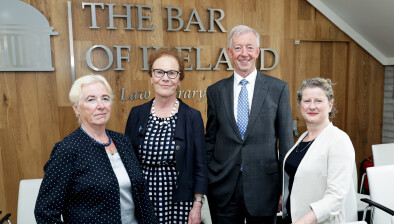Child Law Project urges action on lack of specialised services and residential placements for vulnerable children

Dr Maria Corbett
The lack of specialist services and residential care beds in Ireland for children with behavioural difficulties is a key theme in the latest volume of case reports published today by the Child Law Project.
The new volume comprises 62 reports — 50 from the District Court and 11 from the High Court — including one composite report on special care cases heard by the High Court.
The majority of District Court cases attended by Child Law Project reporters concern applications for care orders. Echoing previous volumes, key themes include parental mental health, parental addictions, homelessness and domestic violence.
Some of the parents subject to proceedings face other personal difficulties; in three cases, the parents had themselves been in care, and in a further five cases, a parent had died, including in violent circumstances.
The new volume includes a small number of cases of separated children (unaccompanied minors) fleeing war abroad. The remaining cases related to a child already in care and included discussions on assessments, therapies, placement breakdowns and access arrangements.
The composite special care report is on proceedings where the High Court can detain a child in a secure setting for therapeutic purposes. The report covers a 15-month period during which time the Child Law Project observed the cases of 48 children.
The report highlights the serious concerns expressed by the presiding judge in relation to difficulties in securing appropriate residential placements, the lack of specialised facilities and poor interagency co-operation. Similar concerns are mirrored in many of the District Court cases published today.
Dr Maria Corbett, CEO of the Child Law Project, said: “The lack of step-down residential placements is hindering the timely discharge of children from special care. This is particularly concerning given that these are secure placements which entail a deprivation of liberty.
“A delayed discharge may undermine the child’s progress or risk them becoming institutionalised. The presiding judge, noting that this problem has been going on for years, commented that he felt like a ‘stuck record’ and once again relayed the court’s concerns to Tusla, the Child and Family Agency.”
The focus of several of the cases is the State’s inability to provide appropriate placements for vulnerable children.
In one such case, a teenage girl who was both in care and a ward of court was detained for several months in the paediatric wing of a hospital due to escalating patterns of self-harm. CAMHS refused to admit her to one of its inpatient units.
After a failed attempt at mainstream residential care, the teenager was placed in the ‘least worst option’ of a children’s hospital. She remained in this hospital for several weeks where she shared a room with a young child before being admitted to a special care unit.
In another case, concern was expressed about the isolation being experienced by a young girl, previously in secure care, who was placed in a residential unit on her own with two staff members and with controls on her access to the internet.
Dr Corbett said: “The State appears ill-equipped to respond to children who have experienced trauma or loss, who have a disability or mental health issue and whose home life or care placement has broken down. These children often display self-harming and other challenging behaviours.
“Discussions in court cite difficulties recruiting and retaining care staff, the limited number of special care beds, and the narrow legislative definitions required to trigger an obligation on HSE disability and CAMHS mental health services to get involved.
“Political attention is urgently needed to rectify the State’s failure to provide a timely, joined-up response to these vulnerable children.”
The volume also includes a case where the District Court granted an interim barring order against a man who was in custody but who was likely to be released back to the family home on bail the following day. It was an unusual case because the barring order was not sought by the man’s partner, but by Tusla, under section 11 of the Domestic Violence Act 2018.
Dr Carol Colter, executive director of the Child Law Project, said: “This is the first time we have observed this provision of the 2018 Domestic Violence Act being used. The CFA is to be commended for its efforts to protect this mother and her children from the threat of violence, in circumstances where the mother had applied for a barring order but later withdrew it.”
Another District Court case involved two siblings who had been in care with the same relative foster carers for 10 years under a voluntary care agreement. The parents were often uncontactable due to addiction and homelessness.
Tusla said the parents had thwarted their care of the children by not signing consent forms which delayed an assessment for one of the children and meant the children had missed out on a holiday. The children called their foster carers Mom and Dad and the GAL said: “When I mentioned the possibility of them returning to their parents, they just looked at me in a state of bewilderment.”
Dr Coulter said: “This case is a good illustration as to why the long-term use of voluntary care agreements can be problematic. The forthcoming reform of the Child Care Act is an opportunity to amend the legislation to put in additional safeguards.”









